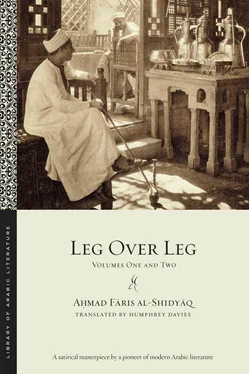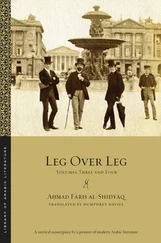53“a man’s practicing coitus with one woman and then another before ejaculating and a man’s practicing coition with one woman and then another before ejaculating” ( al-fahr wa-l-ifhār ): the Qāmūs states that these two verbal forms from the same root are synonymous.
54“a little-used word for plain copulation” ( al-nashnashah ): defined in the Qāmūs simply as nikāḥ (“copulation”).
55“a noun meaning copulation from which no verb is formed” ( al-ʿaṣd ): the definition in the Qāmūs runs al-nikāḥ lā fiʿla lahu .
56“dashing water on one’s vagina”: the next word in the text— al-ʿaṣd —has occurred eight items earlier (see n. 55); here the author may have intended al-ʿazd , which is synonymous with the former (though it has a verbal form).
57“the flesh of the inner part of the vulva” ( al-kayn ): this is followed in the text by al-ṭuʾṭuʾah , for which no meaning has been found.
58“the vulva said four other ways”: the author supplies four more items ( bizbāz, fāʿūsa, khurnūf, mashraḥ ) that the Qāmūs defines simply with the words farj and ḥir (“vagina” and “vulva”).
59“the flabby vagina”: in the text al-ghuḍāriṭī , which is not to be found in the Qāmūs (or other dictionaries) and is probably a misprint for al-ʿuḍāriṭī , in which case it is a repeat from above; this possibility seems stronger, given that the following word is also a repeat (see the following note).
60“the vagina that dries the liquid from the surface of the penis” ( al-maṣūṣ ): a repeat from above where, however, the second sense given in the Qāmūs seems more appropriate.
61“another name for the vagina” ( al-ṭanbarīz ): defined in the Qāmūs simply as farj al-marʾah (“a woman’s vagina”).
62“the bizarrely spelled” ( al-khafashanfal ): the word, defined simply as “a woman’s vagina,” is of a particularly unusual form and without related words that might throw further light on its meaning.
63“the ‘nock’” ( al-fūq ): after the notch in the end of the arrow that fits the bowstring.
64“and the vagina again in another exotic spelling” ( al-qaḥfalīz ): as alkhafashanfal , see preceding note.
65“instruments of erection” ( adawāt al-naṣb ): adawāt is a grammatical term (literally, “instruments”) applied to particles (prepositions, adverbs, conjunctions, and interjections) that govern other words; adawāt al-naṣb (e.g., an, lan, idhan, kay ) require that words they govern end in a naṣb ; however, naṣb , in its non-grammatical sense, means “lifting up, erecting,” and the author puns on this.
66“the thrower, the catapult,” etc.: many of the items in this and the next list appear to be epithets.
67 khabanfatha : defined simply as “a name for the anus” ( Qāmūs ).
68“the fontanel” ( al-rammāʿah ): so called “because of its elasticity” (Jamāl al-Dīn Muḥammad ibn Mukarram al-Ifrīqī Ibn Manẓūr, Lisān al-ʿArab , http://www.baheth.info/).
69“the dry and sweaty smelling” ( al-ṣumārā ): cf. al-ṣamīr “the man whose flesh is dry on his bones and who gives off a smell of sweat” ( Qāmūs ).
70“the draining vent” ( al-ʿazlā or al-ʿazlāʾ ): literally, the mouth at the bottom of a waterskin used to drain off the last remains of the water.
71“the black one” ( al-saḥmāʾ ): in the text this is followed by al-funquṣah , for which no meaning has been found.
72“the bunghole and the butthole” ( al-burʿuth wa-l-buʿthuṭ ): two further words meaning “anus,” with no further senses and with no other members to their respective roots.
73 adawāt al-jazm : particles (see n. 65) that govern words ending with a closed syllable ( jazm ), e.g., negational lā, lam ; in its non-grammatical sense, jazm means “cutting off or amputation,” whence the expression in the Qāmūs, jazama bi-salḤihi “he voided part of his excrement, part thereof remaining” or simply “he cast forth his excrement” (Lane, Lexicon ).
74“another word for the penis”: al-suḥādil defined simply as dhakar (“penis”).
75“the strong, crafty wolf” ( al-ḍabīz ): such is its definition in the dictionaries, with no indication that it may be used figuratively.
76“the thimble” ( al-qusṭubīnah ): this and the next item refer presumably to the glans penis.
77“the prick” ( al-qahbalīs ): a word not found in the dictionaries, though the related qahbalis occurs, defined in the Qāmūs as zubb (“penis,” a vulgarism).
78the qaṣṭabīr : an orphan word, the only one in its root and cited in only one dictionary ( Qāmūs ), where it is defined simply as “penis” ( dhakar ).
79“the tassels” ( al-jazājiz ): assuming that their use in the sense of “penises” derives from the underlying meaning of “tassels of colored wools with which the [women’s] camel-litter is decorated” ( Lisān ); singular jizjizah .
80 adawāt al-jarr : particles that govern words ending in i , i.e., prepositions that govern the genitive case; in its non-grammatical sense, jarr means “drawing toward, attracting,” prepositions being so called because the governed word is “attracted to,” or governed by, them.
81“to shtup” ( ʿazaṭa ): described in the Lisān as “seemingly a metathesis of” ( kaʾannu maqlūbun min ) ṭaʿaza (the next to preceding item in this list).
82“another word of similar form but dubious status” ( ʿazlaba ): the author of the Lisān writes, “I cannot confirm it” ( lā aḥuqquhu ).
83“to bridge” ( qanṭara ): assuming the use of this denominal verb in the phrase qanṭara l-jāriyah (“he had intercourse with the slave girl”) derives, perhaps via a visual image, from the base sense of the noun qanṭarah (“bridge”).
84“to fuck hard” ( qasbara ): assuming the verb derives from the nouns qisbār or qusburī meaning “a hard penis.”
85“to fill her up” ( qamṭara ): cf. ( Lisān ) “to fill a water skin” and “to tie off a water skin with its thong.”
86“to kick her” ( laṭaza ): if we assume that this sense derives from that of “to kick (its calf), of a she-camel.”
87“and a variant of the same” ( lamadha ): the latter is a dialectal form of the preceding, i.e., lamaja ( Lisān ).
88i.e., beginning with the first letter of the Arabic alphabet and ending with the last.
89Meaning here the Arabs of the Arabian Peninsula in the days before, during, and shortly after the appearance of Islam, that is, the speakers of the pure Arabic language before its corruption by contact with other peoples and its decadence as the result of the passage of time.
90The Qāmūs equates the two words at the point in its entry from which the author takes this definition; elsewhere, however, he defines khajawjāh as “a wind that blows constantly,” thus supporting the author’s argument.
91“his ‘ocean’” ( qāmūsuhu ): see Glossary.
Читать дальше












